Companies like Paizo have done a really good job of including a variety of people in their products. In non-Earth RPGs you don’t have the same ethnicities that you do on Earth, but often the people in those non-Earth environments reflect qualities of Earthly human ethnicities. For example Keleshites are a generic analog to cultures of the Middle-East. There are hundreds of ethnicities in the region, but they are categorized together due to a shared set of values. An Iranian and a Saudi would likely have differences in diet, community, language, and religion, but those differences would be more similar to each other than if they were compared to a person from East Asia or Southern Africa. This is why we group them together, for ease of identification.
I’m not here to talk about Paizo’s’ representation of people, but about the player base for RPGs like Pathfinder. Despite all the work done by these companies, tabletop RPGs players-bases are mostly White and I want to discuss a little bit about why that may be. Full-disclosure, I have no hard data to back any of these statements up, but I do have some personal experiences in my local RPG scene to help explain some points I’ll make here.
Why Don’t People of Color Play Pathfinder?
The short answer to that is we do, just at lower rates than Whites. My local PFS community is relatively small (maybe 60-70 total members) in a city of 1.5 million. In my two years of attendance to games at least twice weekly to different parts of the city I have met a total of 7 Black RPG players who come with varying frequency, with a mythic 8th I’ve never seen before but have heard of. Our local PFS community is wonderful and welcoming to everyone, so the community doesn’t seem to be scaring people away. So why in such a big city are there so few People of Color playing Pathfinder?
Neighborhood Divisions
I live in the city of Philadelphia. Philadelphia is a minority-majority city (A city where there are more People of Color than Whites) with a total population of 1.5 million spread into more than 60 neighborhoods. These neighborhoods form the boundaries of where people feel comfortable exploring. It can be a challenge to get people to try and get out of their comfort zones to go experience new things. While this may seem just part of common reluctance to do uncomfortable things, the neighborhood divisions in Philadelphia can feel like a high wall to people, In my professional career we go into neighborhoods to give assistance, but if we ever vacate a neighborhood, it’s unlikely those people will visit us as a site a few neighborhoods over. This relates to Pathfinder Organized Play attendance in that only a handful of neighborhoods in Philadelphia have stores that offer RPG products or playspace and even fewer of the stores are in neighborhoods that are minority-majority. This may not be a Philadelphia only issue, other cities have their own array of neighborhoods, and even people in the country may have perceived borders.
Availability of Gaming Stores
To piggyback off the last heading, there are only a few stores in Philadelphia that host Pathfinder Society. A few more offer D&D Adventure League but in total the stores that offer RPG organized play can be counted on two hands with a few industrial accidents. There are a lot of stores that offer similar hobbies like card and board games that don’t offer RPG merchandise. This reduces exposure to those styles of games for the people with those style of gaming stores in their neighborhood. Some of the reasons I’ve heard for the lack of RPG organized play space are; not enough physical space, lack of profit from hosting groups, and groups being rowdy or disrespectful. These are all legitimate reasons for stores to avoid hosting RPG play, but it lowers community exposure to those games as a whole.
Income
This is not a distinctly minority issue. In fact, on a recent Know Direction Perram spoke about the challenges of starting a PFS game day in a low-income region of Kentucky. Income (and lack thereof) hampers people’s abilities to start new hobbies. Sure, the core rulebook may only cost $20, but $20 also buys 3 boxes of oatmeal, 2-10 packs of ramen, 4 boxes of pasta, and 3 pounds of ground beef for the week. There are people everywhere who would like to do all sorts of hobbies if they only had the means. Using Philadelphia as an example the median household income in the city is just under $37,000. On the map below, only one of the stores in Philadelphia that offer regular organized play resides in an area where the median household income is less than $40,000. Those lower income neighborhoods without game stores are also minority majority, limiting lower income minorities access to places to pick up the hobby and play. Regardless of race, Philadelphia itself is poor for a large city with the median household income being almost $6,000 lower than Baltimore. Limited income creates limited accessibility to hobbies.
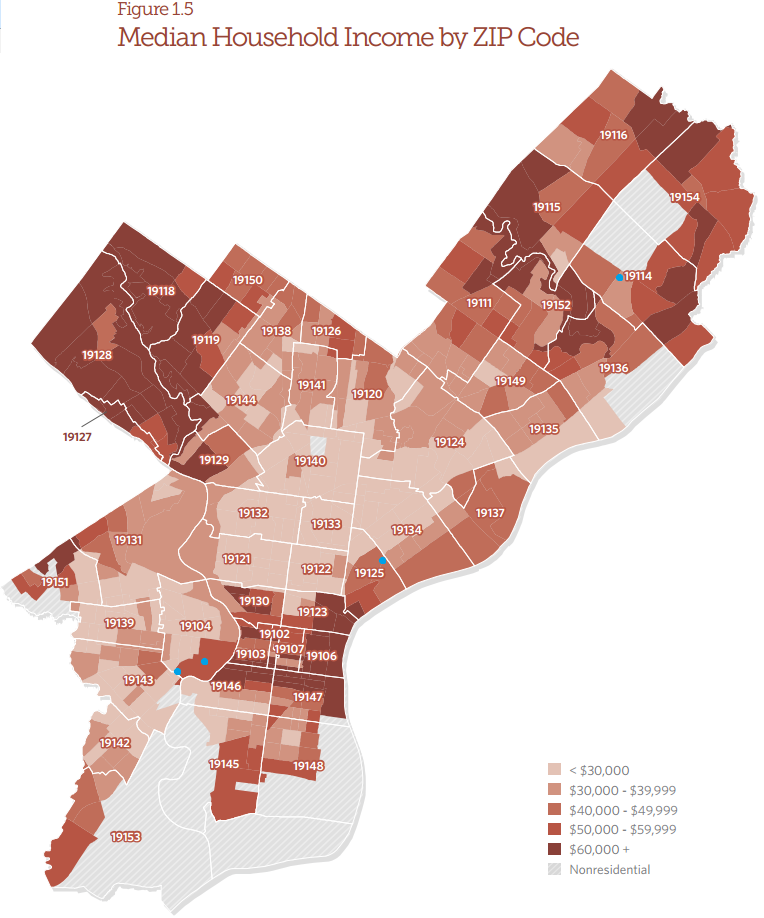
The blue dots represent game stores with regular Pathfinder Society organized play in zip codes; 19114, 19125, 19104, and 19143.
Eurocentrism of Golarion and General Disconnect from Fantasy as Culture
In the United States, all non-Native Americans are immigrants from somewhere. When people immigrate they tend to keep the stories, folk tales, and legends of their homelands. In many of those cultural works things common to RPG settings exist; castles, kingdoms, dragons, mythical beasts, and magic. These things exist in non-European culture, but not with the same significance. Since so many facets of fantasy RPGs are tied to one culture, it can be hard for people outside of that culture to see the significance. As a personal example the folk tales and stories I heard growing up weren’t of fantasy tropes, but stories like John Henry and his Steam Shovel, biblical stories, and inspirational tales of bonded people standing up for themselves. While great fantasy fuel, they were stories that boosted human achievement over divine or magical intervention (Save for the bible).
This is all based off my personal experiences as a black guy to help explain a phenomenon I’ve witnessed and heard other people wonder about. I think to help grow our hobby we have to be aware of barriers to entry for the hobby for all sorts of people, not just people of color. The more people at an organized play table the better right? (Well, 6 is fine. But more tables is even better!) This is by no means a complete list or peer reviewed in any way, and if you have anything to add please put it in the comments below. It may help some of your coordinators figure out how to boost engagement with a dope hobby

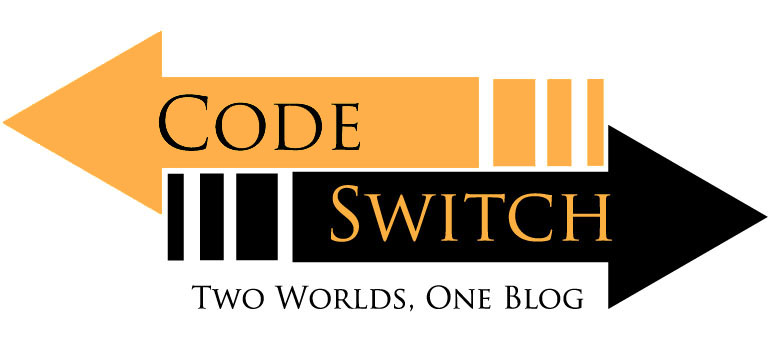
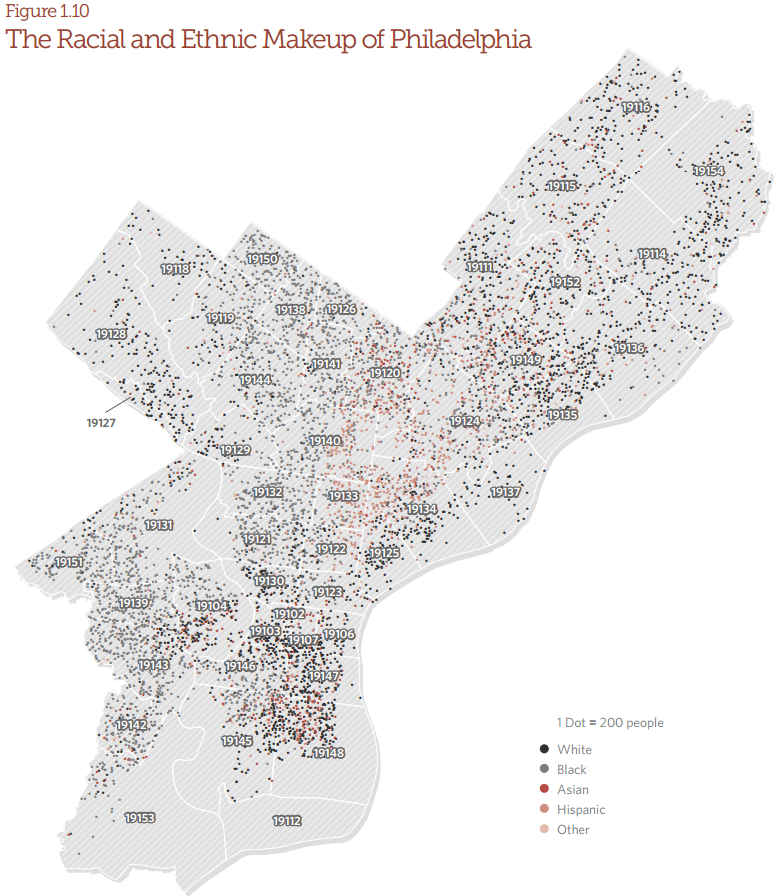

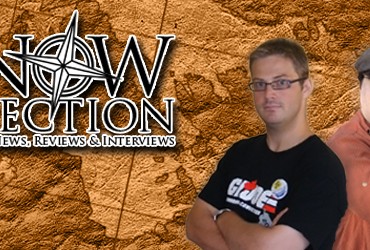

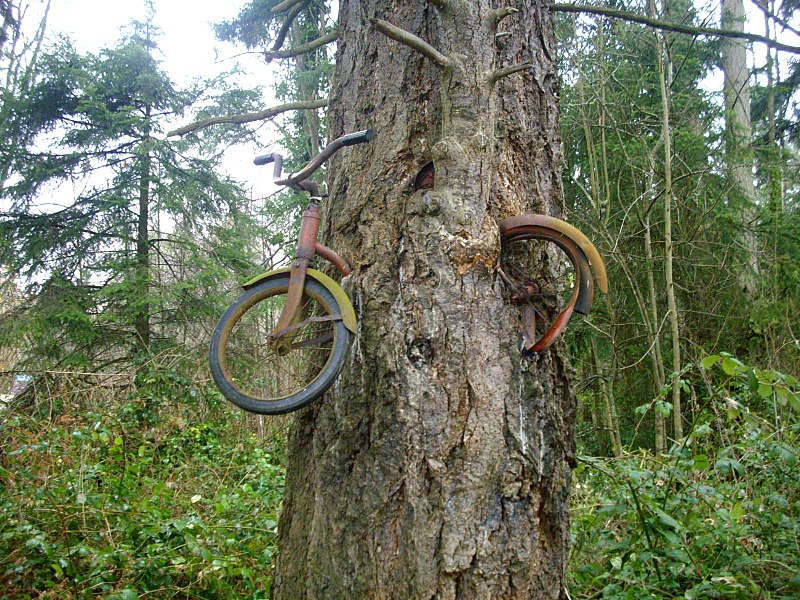

Disclosure: I GM. I’m white and live in a dominantly white area of Northern Michigan. This is just my conjecture
I don’t think that cost is a factor anymore. Many Pathfinder/D&D 5e players I know in my area are low income, a few are actually homeless (!) Any game that has OGL content you can play if you have WiFi access and a phone. Some of the poorest people I know regularly meet at the library passing around a set of $4 dice and doing Pathfinder using only the SRD and free content.
I find that is is often cultural factors that keep players away from the table. Every culture has it’s own mythologies and folk heroes. I find that many roleplaying games are still too Eurocentric or anime inspired to connect with African-American, Latino, or Middle eastern audiences. Which is a shame, because each has a rich mythic tradition to draw from to create fresh settings. Game developers need to think outside of the Greco-Roman/Tolkien box to connect with a diverse player base
I also find that fantasy isn’t part of the cultural narrative for many urban minority groups. Much urban/hip-hop culture is based in part on “Keepin’ it Real,” namely acknowledging the realities of life as a minority and the struggles of daily life (it’s the reason you don’t see many roleplayers in rural Kansas. the cultural narrative is about blue collar life, and you “outgrow” fairy tales when your 10 or so).Escapist fantasy, like roleplaying games, really doesn’t fit in that worldview. Most music and films marketed to the urban minority demographic is drama focused on very realistic situations. There are exceptions to this, groups like The Wu-Tang Clan and MF Doom, but they are few. Another factor in low minority participation could be the emphasis on athletics in minority culture. Although not as bad as in the early 1990’s there is still a rift between Geek and Jock culture (I don’t see many gamers playing football around here). Many minority pop culture icons are sports stars, and Athletics are seen as a more productive pastime for youth in urban settings, and more socially acceptable.
Lastly, the stigma of Roleplaying games as a “white thing” is somewhat self perpetuating. Minority players may feel out of place in an otherwise all white game group. I encountered this in a group I’ve GMed for about 2 years. I have one player who is Korean-American, the only non white player in this group. For the first year and a half, he seemed a little nervous, and the only characters he’d play were half-elf Samurai, Monks, or other stereotypically Asian archtypes. Now that he’s comfortable with the group, he plays a wider range of characters, his best is a dwarf gunslinger he plays in character very well. But it took a long time of warm friendship and fun to bring him to a comfort zone where he could express himself fully
Though, in closing, I do see more diversity at roleplaying tables all the time. About half of my players have been women (one was as old as 43),and many more non-white, non male, people with disabilities, and LGBT people play in D&D encounters events at my LGS all the time. I think the future is bright for minority involvement in roleplaying games, but needs a lot of work.
Keep playing and may you never roll a 1
I really enjoy your examination here. Everyone has their own reason for wanting to join the hobby with their own obstacles. Truth be told, I only got into Pathfinder because I was going to move far away for a job and was looking for a hobby. I ended up not moving, but keeping the hobby.
A site like roll20 is probably in a good position to get gamer demographics for the online RPG community. Personally, I don’t see the point to try and categorize gamers other than for marketing purposes. I’ve played with some people sight unseen for years. I recall one guy who told me his claim to fame was being a reoccurring character in music videos for a semi-well known band as a little person. I’ve also gamed online with some trans gamers (I made the mistake of using the wrong pronoun when first chatting online). I really couldn’t say definitively the race of most of the people I’ve played with online, which in my case doesn’t really matter. My current group are mostly a bunch of middle aged white guys like me though and we’ve been gaming online for over 3 years. But, I’ve only learned that after-the-fact gaming with them. It was by no means a criteria for gaming.
I suspect that the online gaming community is far more diverse than the personal experiences of the OP and other commenters because geography is not a factor.
Geography has a lot to do with it. When this got shared to the Pathfinder RPG Facebook group, there was a lot of replies from people in Southern California, unsuprisingly, saying their groups had a large latin player base. Online is a good way to just see who shares your hobby and who may be uncomfortable or unable to play in person games due to geography.
Good article. I started my gaming in Philadelphia back in the late 1970, so some of my observations are a bit dated. You seem to have more gaming stores in the city than in my day, so that’s a plus.
– Most RPGs live or die by word of mouth (a few like D&D have cleared the “gaming event horizon” and are at least somewhat known in pop culture). This applies to both game groups and the particular game itself. My experience with Traveller has been that the “gun bunny” reputation and the insular nature of the game has limited it’s spread. Pathfinder, as a fork of D&D, probably has it a little easier.
– Culture/class (there’s some intersectionality here) plays a big part. If you aren’t part of a circle that provides access to the larger gaming community, you may wander in the wilderness for quite some time or live your life unaware of what you’re missing. I was lucky to hook up with the U of PA gaming group early, which required following up on an ad in the back of a gaming magazine, which is a lot of ducks to get in a row. Connectivity is easier now, but only if the group is visible online. Also, it helps to have a grounding in certain books (SF and Fantasy), which requires access to a home/school/public library. The popularity of fantasy and SciFi in mass media across the mainstream indicates an interest in gaming is probably there as well, waiting for a way to cultivate it.
– White privilege and the apprenticeship program: There seems to be a problem with established groups not doing any outreach. Part of it is introvertism, but part is the feeling that “if they really want to be here, they’ll get here” which has the usual blind spot for people outside the mainstream race/class having a tougher time of it. If gaming conventions are held in places only accessible by car and requiring a hotel stay, that limits who can get there.
– With Traveller in particular (my main experience, though I suspect it’s not alone among the older game crowds) I ran into a tussle over game books that didn’t give a lot of art space for PoC or non-pinup class women. While I believe in the power of imagination just as much as the next gamer, there’s a lot to be said for books/movies/games that show a broad selection of people. Being able to “see yourself” in a game/book/movie is a privilege. Often people that never have to deal with this issue tend to poo poo it the most…
Your note on the “apprenticeship” nature of RPGs fits my theory on this — in my experience, most people pick up RPGs from people in their family, school, or social circles, and most Americans’ circles are made up predominantly of people of their own race.
If the older, experienced gamers are primarily white, and they predominantly transmit the hobby within their personal circles, then new gamers are likely to also be primarily white. In my case (white guy playing since the late 80s), I learned D&D from my uncles (white), played with middle and high school classmates (in a nearly 100% white school district), and in life since college have made new players out of colleagues in my (primarily white) workplaces.
As James notes, even where FLGS can serve as sites for transmission of the hobby to curious strangers, those stores are likely to locate near their (primarily white) existing customer base, in the (primarily white) neighborhoods those customers live in.
With fantasy and gaming of all kinds more “mainstream” than they used to be, and resources like the PRD reducing cost barriers, there’s more opportunity for new gamers to independently stumble across the game and start playing on their own than there once was, but apprenticeship within personal family and social circles, combined with the de facto race and class segregation of much of America, means that curious newbie gamers are much more likely to find existing gamers within their circles if they are white than if they are people of color.
10/10, couldn’t agree more.
@ Dan. Philadelphia is an odd city in its own way, as I’m sure you’re aware. I only started Pathfinder because of finding a Society listing on Meetup a few years back, I had no other peers who played. If you’re ever in Philadelphia again, just off of UPenns campus on Lancaster ave theres a FLGS that hosts PFS on Tuesdays and conventions quarterly called Redcaps Corner.
If you go, you could hang out with 2/7 of the Know Direction Crew!